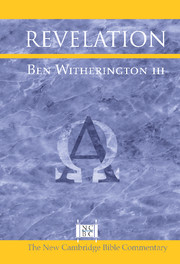Book contents
- Frontmatter
- Contents
- Preface
- A Word about Citations
- Map of Western Asia Minor and the Island of Patmos
- List of Roman Emperors
- List of Abbreviations
- I INTRODUCTION
- II SUGGESTED READING ON REVELATION
- III COMMENTARY
- IV APPENDIX: A MILLENNIAL PROBLEM
- Author Index
- Extra-Biblical Texts Index
- Scriptural Index
- Subject Index
II - SUGGESTED READING ON REVELATION
Published online by Cambridge University Press: 05 February 2015
- Frontmatter
- Contents
- Preface
- A Word about Citations
- Map of Western Asia Minor and the Island of Patmos
- List of Roman Emperors
- List of Abbreviations
- I INTRODUCTION
- II SUGGESTED READING ON REVELATION
- III COMMENTARY
- IV APPENDIX: A MILLENNIAL PROBLEM
- Author Index
- Extra-Biblical Texts Index
- Scriptural Index
- Subject Index
Summary
This reading list – by annotations, rubrics, and guideposts – is intended to serve as a point of entry for the new student of Revelation. In addition, for all levels of readers it should serve as an up-to-date, annotated bibliography of some of the most helpful literature on this complex book; it is meant to be “reader friendly” instead of exhaustive. For a fuller bibliography on particular passages and issues, the reader is encouraged to consult D. Aune's three-volume work on Revelation (see commentaries listed below).
For a general introduction to the interpretation of Revelation, see J. Ramsey Michaels, Interpreting the Book of Revelation (Grand Rapids, Mich.: Baker Books, 1992), but it covers the literature on the subject only written by 1991. If one is looking for a brief introductory reading of the whole work, one could turn to C. H. Talbert, The Apocalypse: A Reading of the Revelation of John (Louisville, Ky.: Westminster/J. Knox, 1994) or P. Barnett, Apocalypse Now and Then: Reading Revelation Today (Sydney: Aquila Press, 1989). J. M. Court, Revelation (Sheffield, UK: JSOT Press, 1994), presents a largely European discussion of the Apocalypse. Because of its helpful charts and basic level of discussion, J.-P. Prevost's How to Read the Apocalypse (New York: Crossroad, 1993) is a fine brief introduction to Revelation. The most recent introduction that is also in most ways the most helpful is C. Koester's Revelation and the End of All Things (Grand Rapids, Mich.: Eerdmans, 2001).
THE GENRE OF REVELATION
Most scholars see the book of Revelation as some kind of apocalypse or a work of apocalyptic prophecy within an epistolary framework. On apocalyptic literature the best introduction is still John Collins, The Apocalyptic Imagination (New York: Crossroad, 1984). Two collections of essays especially helpful in dealing with this literature are Apocalypticism in the Mediterranean World and the Near East, ed. D. Hellholm, 2ded.(Tübingen, Ger.: Mohr, 1989) and The Encyclopedia of Apocalyticism, Vol. 1, ed. J. J. Collins (New York: Continuum, 1998). There are in addition some special studies on this genre of literature that are helpful. C. Rowland, The Open Heaven (New York: Crossroad, 1982), emphasizes that apocalyptic often focuses on otherworldly mysteries, and M. Himmelfarb, Tours of Hell (Minneapolis: Fortress, 1983), stresses that many such works involve tours of the other world.
- Type
- Chapter
- Information
- Revelation , pp. 51 - 64Publisher: Cambridge University PressPrint publication year: 2003



